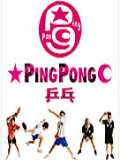
Ping Pong
Rating: 7/10
Year: 2002
Genre: Comedy
Director: Fumihiko Sori
Cast: Yosuke Kubozuka, Arata, Sam Lee, Shido Nakamura
With the rapid evolution of the computer graphic technology, comic adaptation has become a popular trend for filmmakers all over the world. In Hollywood, there are comic-movies like Daredevil, Spider Man, and in Hong Kong, Storm Riders, A Man Called Hero and Mater Cute 2001 are also adapted from domestic comics. Japan, the kingdom of comic, wouldn't fall behind as well, the diverse comic market has provided unlimited choices for filmmakers. This time, the beloved Ping Pong has made its way to the big screen.
The story centers on two main characters, Peko (Yosuke Kubozuka) and Smile (Arata). Both of them are talented ping pong players, and they also happen to be good friends. Peko is arrogant while Smile is just the opposite. Similar to its counterparts, Ping Pong follows the formula of this genre strictly, that is, it begins with the introduction of the protagonists -> short success -> failure -> revitalization -> final success. While the story may not seem to be too much of a surprise, audience should remember not to overlook the subtle computer special effects. It is said that the director Fumihiko Sori used to work on some special effects projects in Hollywood before, that may explain why the effects in this movie are so well planned and executed that it is hard to find a flaw.
Comic and movie are two different medium. Comic, which can expand to many pages and issues easily, always allows more room for characters and plot developments. While for film, due to the limited duration, everything is kept short and concise. Therefore, comic is usually severely trimmed or modified when it is adapted to film. I have not seen the comic of Ping Pong before, but it seems that the story of the movie is quite monotonous. Except for the major ping pong tournament plot, there is almost no sub-plot at all. As the audience, we do not know anything about Peko and Smile's life, whether they have a family or girlfriend is kept unknown to us. We are also not sure if they have received any pressure from their family or the school. The lack of character development has weakened the dramatic tension quite a bit. Nevertheless, perhaps it is because of this simplification of subject matter, the director was able to double his effort in certain areas. In this movie, the most remarkable part is definitely the depiction of Peko and Smile's friendship. Without the use of any ostensible scenes or blatant dialogues, Fumihiko Sori was able to make us believe the intimacy of their relationships through a series of events that do not seem to be over-passionate.
Among all the popular young actors in Japan, Yosuke Kubozuka may not be the most handsome one, but he is absolutely the most talented one. From the furious Korean student in Go! to the highly comical Peko in Ping Pong, he is never tired of delivering surprise to us. Compared to the outgoing Peko, Arata's Smile (named because he never smiles) is just too reserved and stoical to win the love of the audience. Hong Kong actor Sam Lee also shares a role as a Chinese ping pong player, but with the focus on the two leads throughout the entire film, there is not much he can do to steal the spotlights.
In short, Ping Pong is an entertaining movie. While the plot may seem little monotonous, it does successfully raise up some interesting topics (e.g. the alternative definition of hero) that are worth some further explorations and contemplations.
Cool guy(s) - Yosuke Kubozuka
Reviewed by: Kantorates